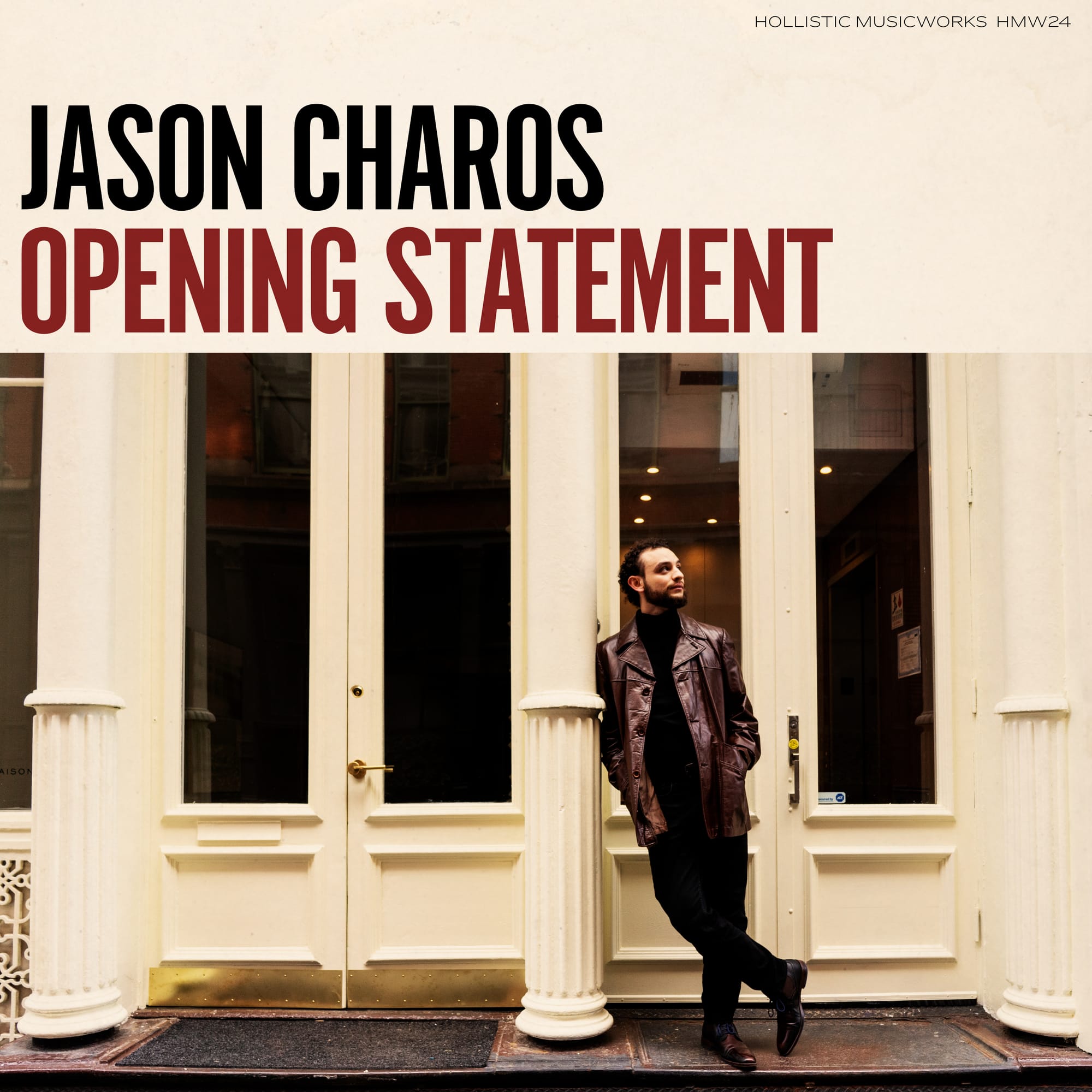Jason Charos: Opening Statement, jazz as declaration

Waiting to be absorbed, musical notes drift like whispers in the air. A unique soundprint begins to form—rooted in heritage, shaped by gratitude, and colored with emotion. Each frequency carries the breath of its creator, revealing the universe of someone who has chosen art as a way of life. After years of quiet refinement, the eight songs breathe: they are alive.

The musical mind behind these songs began to take form in Florida. “There was a big band for kids that my parents put my brother and me in. Dad told me, ‘You should play the trumpet.’ So I got a little one, and that was it—I never looked back.” The memory belongs to Jason Charos, whose early encounter with the trumpet marked the beginning of a lifelong dialogue—one that now finds its voice in Opening Statement, his debut album.
“It’s my announcement as a leader in the jazz world and as a composer,” Charos explains. “I’ve been working with Samara Joy, doing arranging and playing, but this is the first time I’m featuring my own original compositions.”
Charos approached the album like a live concert—each piece chosen not only for its individual voice, but for how it would resonate in sequence. “I selected the compositions I felt would flow well together, as if I were playing a concert,” he says. “I thought about how the tunes would sound one after another to make the listener want to keep listening.” Recorded in March 2022, Opening Statement unfolds as a sonic multiverse where Charos moves fluidly between the traditions of Latin jazz and the Great American Songbook, inviting listeners into a space where heritage and innovation coexist.
Behind the fluidity of his playing lies a foundation built through mentorship. Trumpeter Brian Lynch—who produced the album and released it on his label Holistic MusicWorks—was Charos’s teacher in Miami for six years. “Brian has been my closest mentor,” he says. “His methodology on how to practice, and how to integrate working on the instrument with working on music itself—that was a big lesson early on.” Lynch’s philosophy of being a pluralist purist, deeply rooted in both straight-ahead and Latin jazz, shaped Charos’s approach to authenticity: to inhabit each style fully, never halfway.
His compositions rarely begin with imagery—they emerge from sound itself. “Up to this point, I haven't written anything inspired by something external from the sounds that I'm hearing,” he says. Titles arrive later, after long contemplation. What initiates the process is emotion—an impression, a sensation, a cluster of ideas waiting to take shape. “It’s trying to communicate or capture an emotion or a concept of ideas that I’m working on,” he adds. While visual art and nature may leave subtle traces, it’s often the quiet act of walking—the feeling of a beautiful day—that stirs something deeper. “Looking out my window now, it looks like a gorgeous New York autumn day,” he reflects. “Perhaps that will inspire me to write more things down later today.”
At the center of it all is the trumpet—unyielding, honest, and alive.
“It’s definitely an unforgiving instrument,” Charos admits. “It keeps you honest and in constant practice. But when the connection is right, when breath and brass align, the feeling is unmatched. No matter how my chops are, getting to play music and express myself artistically is the greatest feeling.”
That search for deeper meaning found fertile ground in the teachings of Melvin Butler, the tenor saxophonist and scholar featured on four tracks of the album.“Melvin was one of my professors at the Frost School of Music,” Jason shares. “He’s a brilliant thinker and musician, and our conversations often reached beyond technique—into culture, history, and the spiritual dimensions of sound.” Butler’s contribution is not just musical, but philosophical. His tone—both in performance and in thought—helped Charos envision jazz as a living archive: one that reveres tradition while remaining open to transformation.
“With Melvin Butler, the lessons were more philosophical,” he reflects. “His expertise in musicology, particularly in studying the intersection of music and religion, really expanded my thinking. One of the most powerful ideas he shared with me was that music is not a universal language—it means different things to different people, depending on both their culture and context. That really stayed with me.”
Jason’s Greek heritage echoes quietly through his music. One such echo appears in his connection to Dafnis Prieto, the Cuban-born drummer and composer whose rhythmic genius helped shape Charos’s compositional voice. Their bond goes beyond technique; it touches something mythic. In Greek, Dafnis (Δάφνης) refers to the laurel tree—daphne—whose leaves were woven into crowns of honor and victory.
The Crown is a tribute to that lineage—both musical and ancestral. Inspired by his time studying with Prieto, the piece carries the weight of tradition and transformation. “Studying with Dafnis completely opened up my rhythmic concept and approach,” Charos reflects. “He’s an incredible musician—a true genius—and in his composition classes and lessons, or even just through one-on-one conversations, I learned so much about structure, rhythm, and different ways to begin writing music.”In The Crown, Charos transforms mentorship into music.
The goal is to become free enough—no matter the musical style or improvisatory context. It's about that expression, being free to express, utilizing all the things we've learned from those who came before us in this music.
Alongside Charos, the ensemble breathes with cohesion: David Mason on alto saxophone, Kendric McCallister on tenor, Connor Rohrer on piano, Carlo De Rosa on bass, and Ludwig Afonso on drums. Three years since its recording, the album has had time to settle, deepen, and stretch. With each listen, one might begin to wonder: if they sounded like this then, how are they blending now?
Opening Statement is composed of eight songs—but above all, it reflects how Jason Charos comprehends life: as rhythm and reverence, as dialogue and devotion. It’s not just a record—it’s a declaration of presence, shaped by lineage, lifted by gratitude, and carried forward in sound.